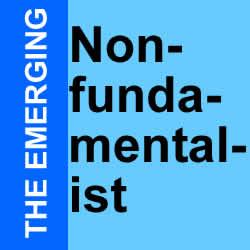My name is Patton Dodd. (“Hi, Patton.”) And I am a fundamentalist.
As all of you here at Fundamentalists Anonymous know, the first step to overcoming your problem is admitting you have a problem. For me, this first step has been the most difficult. How could I be a fundamentalist? I went to graduate school! I read widely and listen to lots of different music! I don’t believe the universe was created in six literal days!
But …
I have these moments. Like the other day, someone said Jesus took Genesis literally—did I think I knew how to read the Bible better than Jesus? Well, of course not. … So I find myself clicking around the Answers in Genesis Web site and wondering if those guys are right after all. I mean, they have all that science.
I react against fundamentalists as much as I do anti-fundamentalists, like author Richard Dawkins. I end up arguing between two versions of fundamentalist thinking—one rooted in the Bible, one rooted in humanism. Either way, it’s a thirst for the drug of absolute certainty. I know it’s destructive and hopeless and that classical Christianity, rooted in the historical witness of the church, is much healthier.
But the withdrawals from fundamentalism are tough to shake.
Attracted to Hard Core
Maybe these things are hereditary. I’ve always had a tendency toward fundamentalism. I was raised Southern Baptist, and I went to a Pentecostal college. I would wager that most of the Baptists and Pentecostals I was around were perfectly sensible people, but I was always drawn to the more hard-core types—the folks who read the Bible only in the King James Version, who thought ecology and geology were mostly junk science.
Their confidence about everything was intoxicating to me. They never opened their Bibles without understanding every word they read. They could explain anything, from the violence in the Psalms to the prophecies in Daniel to the visions in Revelation, without breaking a sweat. Wow , I’d think, that’s real faith.
Actually, it was better than faith. It was confidence that everyone on earth could believe the exact same thing in the exact same way. God’s reality had dropped from the sky, plain as day; and if you just read the Bible or studied history and science in the right way, you could see it, too. It was logical, as long as you used the right logic.
A few times during my hard-core fundamentalist days, I visited other churches: Catholic, Anglican, Presbyterian, Assemblies of God, Vineyard, varieties of nondenominational. I was shocked at the varieties of worship, the different emphases in doctrine. Mostly, I was put off by these other kinds of Christians, especially the dustier ones.
These Christians read the Bible, sure; but they needed complex theology to tell them what the Bible meant. Maybe, I thought, they aren’t really Christians at all. Maybe they’re liberals.
The Middle Way
The allure of fundamentalism is still very much with me. I get around old friends, and they seem so certain of everything and … you know how it goes: One moment I’m listening to AM radio, and the next moment I’m scanning the newspaper for prophetic signs of the End Times and hoping the Republican Party won’t nominate a Mormon for president.
There’s a middle me that has long been trying to emerge. The non-addict. The person who accepts faith in the Resurrection of the Son of God as a gift— and as a matter of historical witness—and lets that frame his perspective. But at some level, it’s an act of faith, which is humbling. My need for certainty can’t be bigger than the God in whom I want to be certain.
Fortunately, Jesus had a lot to say about fundamentalism—so many of those parables (which aren’t so reader-friendly after all) were directed at the fundamentalists of his own day. So I reread those and let myself understand them or misunderstand them, along with the rest of God’s compelling, confounding revelation.
Sometimes I slip into old ways of thinking and other times find that my new ways of thinking are no better. It’s trial and error. It’s a process of recovery, and it’s one day at a time.
Patton Dodd is an editor for Beliefnet and the author of ‘My Faith So Far: A Story of Conversion and Confusion’.




